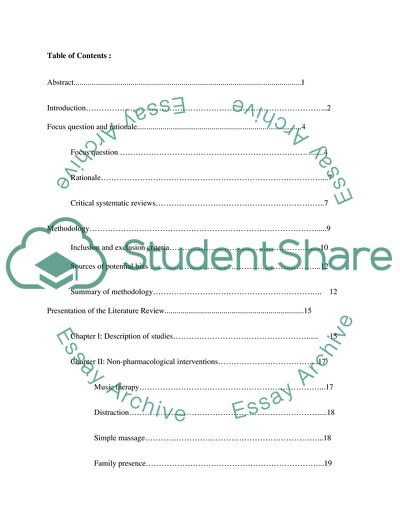
- Home
- Free Samples
- Premium Essays
- Editing Services
- Extra Tools
- Essay Writing Help
- About Us
- Studentshare
- Subjects
- Nursing
- Nursing Interventions in the Pain Reduction with the Use of Pharmacological Intervention Procedures
Nursing Interventions in the Pain Reduction with the Use of Pharmacological Intervention Procedures - Research Paper Example

- Subject: Nursing
- Type: Research Paper
- Level: Undergraduate
- Pages: 39 (9750 words)
- Downloads: 0
- Author: devanbode
Extract of sample "Nursing Interventions in the Pain Reduction with the Use of Pharmacological Intervention Procedures"
The study highlighted the importance of non-pharmacological interventions for patients which may come in the form of music therapy, simple massage, and other related nursing interventions. Other interventions may also be included alongside pain assessment and interdisciplinary care. The importance of assessing pain is crucial to effective pain relief which was discussed by these authors as a necessary part of the patient’s care. Nursing interventions relating to pain management must also focus on independent nursing interventions which the nurse can apply even without consulting with specialists.
In general, these nursing interventions effectively reduced the pain experienced by the patients in the hospital setting, however, these interventions must be used in combination and coordination with each other and with other health professionals. Pain is one of the common medical issues and symptoms which patients encounter. This pain may be acute or chronic; it may also be mild, moderate, or severe. Regardless of duration or intensity, pain often affects patients physically, mentally, and emotionally (Maclellan, 2004).
Managing such pain can therefore be a significant help to these patients, helping improve the quality of their lives and reducing the stress and anxiety which can arise from the pain experience (Maclellan, 2004). Pain management is primarily carried out with the use of pharmacological remedies, however, non-pharmacological remedies have also been recommended for these patients (Stegman, 2001; Manias, et.al., 2005). Although pharmacological remedies and non-pharmacological remedies do alleviate pain in patients, different patients have different needs.
The same patient cannot have pharmacological and non-pharmacological remedies implanted in him or her. Therefore, in some patients, the use of pharmacological remedy is suitable for pain release while in some the pain can be managed by the use of non-pharmacological remedies.
...Download file to see next pages Read MoreCHECK THESE SAMPLES OF Nursing Interventions in the Pain Reduction with the Use of Pharmacological Intervention Procedures
Psychological Approaches to the Management of Cancer-Related Pain
Effects of Progressive Muscle Relaxation Techniques on Chronic Pain among Cancer Patients
Different Kinds of Pain and How They Affect the Body
Postoperative Nursing Intervention for Laparoscopic Cholecystectomy
Postoperative Pain Management
Non-pharmacological and pharmacological methods
The Best Method in Managing Chronic Pain
Pain Management in Children

- TERMS & CONDITIONS
- PRIVACY POLICY
- COOKIES POLICY